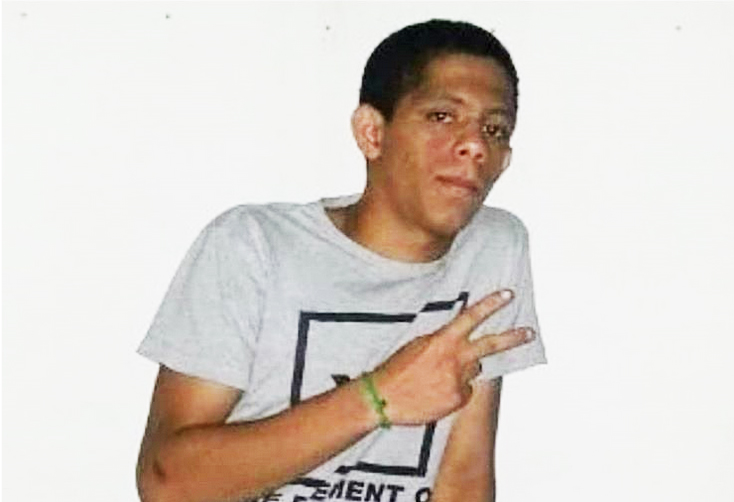Ali was deprived from completing his last high school year in the Industrial School in AL-Muharraq, and from playing his favorite game and hobby “Handball”. In 2015, Ali was arrested without a warrant. He endured many human rights violations; he was interrogated without a lawyer, convicted in an unfair trial, and was subjected to torture in order to coerce a confession. Today he remains in the Jau Central Prison.
On 18 September 2015, police forces, directorate officers and masked individuals raided an apartment in A’ali Village where Ali was hiding and arrested him without presenting any warrant. Ali was fleeing the police because he was wanted by the authorities for several security cases and was convicted in absentia to a life sentence, based on the confession of Ali’s friend who was arrested before him and who, under torture, told the forces about Ali’s whereabouts. Ali’s house was previously raided multiple times by security forces, trying to find and arrest Ali, for inspection, or to summon Ali’s father for investigation to threaten him in order to ask Ali to turn himself in.
Following his arrest, he was taken to the Criminal Investigations Directorate (CID), where he called his father informing him that he was there. The interrogation lasted three days, throughout which he was subjected to torture. On 21 September 2015, Ali was brought to the Public Prosecutor’s Office (PPO), then the second day he was transferred to the New Dry Dock Prison. At the end of 2018, when Ali turned 21 years old, he was transferred to Jau prison, where he remains today.
While at the CID, Ali was subjected to physical and psychological torture, he was beaten severely, in addition to other methods of torture but Ali did not mention it to his family for fear of hurting their feelings. At the PPO Ali was subjected to ill-treatment and was threatened during the investigation to confess the charges raised against him and forced him into coerced confession. Ali has identified the Officer at the PPO responsible for his ill-treatment as being the assistant prosecutor, Muhammad al-Dharhani, who is from the royal family.
Ali did not have adequate time nor facilities to prepare for trial. Furthermore, Ali was not brought promptly before a judge within 48 hours after his arrest; He was brought four days from his arrest. Ali was denied access to his attorney who was not allowed to attend the interrogation. In addition, Ali was not able to present evidence and challenge evidence presented against him. Further, Ali’s first family visit was approximately 2 weeks after his arrest.
Ali was convicted by the High Criminal Court multiple times: 1) On 30 December 2014, he was sentenced to life for detonating a bomb, of attempting murder, and of possessing usable explosive bottles, 2) On 18 April 2015, he was sentenced to 5 years imprisonment for causing intentional arson, 3) On 13 April 2017, he was sentenced to 5 years imprisonment for causing intentional arson felony, Illegal Assembling and rioting misdemeanor, and of possessing & acquiring incendiary material misdemeanor. 4) On 16 April 2017, he was sentenced to 7 years imprisonment for causing intentional arson, and for attacking military personnel.
On 26 October 2016, the High Criminal Court of Appeal overturned Ali’s life sentence and reduced it to 15 years imprisonment. The court has also overturned some of his sentences. At present, Ali’s sentence totals 28 years.
Ali was also subjected to verbal insults while he was at the new Dry Dock Prison and the Jau Prison and was prohibited from practicing his religion and if he did, the prison administration deprived him from making phone calls, receiving visits.
Ali has been denied medical treatment for his ligament injury, obtained while he was pursued by the police. He was taken to Al-Qalaa Hospital but he received no results. Ali’s family filed a complaint with the Ministry of the Interior (MoI) Ombudsman regarding the subsequent denial of medical care. The response of this mechanism was not effective in giving him treatment.
Ali’s treatment is a violation of Bahrain’s international human rights obligation under the International Covenant on Civil and Political Rights (ICCPR), the Convention Against Torture and Other Cruel Inhuman or Degrading Treatment or Punishment (CAT), and the International Covenant on Economic, Social and Cultural Rights (ICESCR), conventions to which Bahrain is a signatory. Ali did not have the right to communicate with his lawyer during his interrogation, his arrest was warrantless, he was tortured and forcibly disappeared, and he was not presented promptly before a judicial authority. Moreover, Ali’s conviction, in light of forced confessions made by others, was the product of an unfair trial. Further, Ali was prohibited from practicing his religion. For the aforementioned reasons, Ali’s arrest, interrogation, and trials are in violation of Articles 7, 9, 10, 14, 17, and 18 of the ICCPR. The denial of necessary medical care is in violation of Article 12 of the ICESCR, which provides for the right to health. And the torture Ali has been subjected to, from the day of his arrest and until his arrival to Jau prison is a significant violation of the CAT.
Americans for Democracy & Human Rights in Bahrain (ADHRB) calls on the government of Bahrain to release Ali. If any charges can be brought against him, ADHRB calls for a retrial to be conducted in accordance with international standards of fair trials. ADHRB calls on the Government of Bahrain to investigate Ali’s allegations of torture, with a view of holding perpetrators accountable. Additionally, ADHRB urges authorities to provide Ali with adequate medical treatment for his deteriorating conditions.





